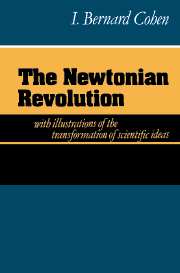Book contents
- Frontmatter
- Contents
- Preface
- PART ONE THE NEWTONIAN REVOLUTION AND THE NEWTONIAN STYLE
- PART TWO TRANSFORMATIONS OF SCIENTIFIC IDEAS
- 4 The transformation of scientific ideas
- 5 Newton and Kepler's laws: stages of transformation leading toward universal gravitation
- Supplement: History of the concept of transformation: a personal account
- Notes
- Bibliography
- Index
4 - The transformation of scientific ideas
from PART TWO - TRANSFORMATIONS OF SCIENTIFIC IDEAS
Published online by Cambridge University Press: 04 May 2010
- Frontmatter
- Contents
- Preface
- PART ONE THE NEWTONIAN REVOLUTION AND THE NEWTONIAN STYLE
- PART TWO TRANSFORMATIONS OF SCIENTIFIC IDEAS
- 4 The transformation of scientific ideas
- 5 Newton and Kepler's laws: stages of transformation leading toward universal gravitation
- Supplement: History of the concept of transformation: a personal account
- Notes
- Bibliography
- Index
Summary
A Newtonian synthesis?
The words “synthesis” and “revolution” abound in the literature concerning the formation of modern science. The previous chapters contain testimony to the ways in which Newton's great work has been conceived to have been “revolutionary” ever since the age of Newton. The Newtonian achievement, however, is often categorized as a “synthesis” rather than as a “revolution”: as in such phrases as “The Newtonian Synthesis” or “The Great Synthesis” (for example, see Ginzburg, 1933, p. 369a; Whitehead, 1922; Butterfield, 1957, p. 106; Rosen, 1973; Gillispie, 1960, pp. 88, 144, 335, 510; Koyré, 1950b). The writers who use this word do not define exactly what they intend by it. For instance, in a brilliant essay on Newtonian science entitled ‘The Significance of the Newtonian Synthesis’, Alexandre Koyré (1950b) not only did not define what he meant by “synthesis”; he hardly used this word in the body of this text, and never in so general a context as the title would suggest.
It would appear that the Newtonian “synthesis” occurs in the literature of the history and philosophy of science as a convenient name for the Newtonian achievement taken as a whole, or the Newtonian system of the world, or the Newtonian natural philosophy. There is usually an implied sense of Newton's having put together the contributions (or, possibly the incomplete contributions) of such predecessors and contemporaries as Copernicus, Kepler, Descartes, Galileo, Huygens, and Hooke, and also John Wallis and Wren.
- Type
- Chapter
- Information
- The Newtonian Revolution , pp. 157 - 221Publisher: Cambridge University PressPrint publication year: 1981

